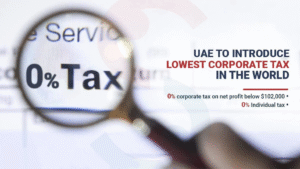

SUMMARY OF TAXATION IN UNITED ARAB EMIRATES
Important notice: UAE does not impose taxes on individuals.
To provide better understanding of tax system in UAE, we summarized all important points and latest updates.
Important Tax Points to be Considered for Expats and Investors:
| Tax-Free Income | Dubai positions itself as a tax-free haven, imposing no personal income tax, no capital gains tax, and no inheritance tax. It means that income from employment, investments, or property sales are not taxed, allowing investors keep and multiply their profit |
| Corporate tax (for commercial entities) | 9%, valid only for large companies with profits over AED 375,000/year (102,000 $) |
| Value Added Tax (VAT) | Implemented in January 2018. UAE imposes a 5% VAT on most goods and services. Nevertheless, residential property sales and leases are generally exempt from the tax, while commercial properties are subject to VAT |
| Excise Tax | is a form of indirect tax levied on specific goods which are typically harmful to human’s health or the environment. Such goods as tobacco, carbonated and energy drinks, etc. are in the list |
| Other Types of Taxes | such as tax on foreign banks, taxes in tourist facilities, etc |
Double Taxation Agreements (DTAs). UAE has established DTAs with numerous countries to prevent double taxation. Expats should consult these agreements to understand their tax obligations both in the UAE and in their home country. Currently, UAE has 142 established agreements with other countries to avoid double taxation on investments overseas.
Taxation in Relation of a Real Estate
Our clients, investors into commercial and residential property, surely find information about taxation in UAE useful and beneficial for the future investments. That is why we would like to share it in details.
Income tax
The UAE does not impose income tax on individuals. Same applies to the property owners of residential real estate.

Here are some Tax Benefits for property owners:
Owning a property in UAE gives to its investors a number of benefits, similar to the ones of a UAE citizen.
There are no direct property taxes on purchases in Dubai, no annual tax, no capital gain tax and no rental income tax. It allows to accumulate and multiply received income faster.
These are one of the mostly asked questions, by our clients:
- What type of taxes applied, when buying or selling property in Dubai?
- What taxes are applicable while renting out an apartment, in Dubai and UAE?
- Should we pay tax while renting out or selling a property?
- Should I become an entrepreneur or register a company, to be able to pay needed taxes?
- How not to violate current law, and avoid huge fines, in the future?
There are the main questions that arise from people who are planning to move to Dubai or already relocated.
Real estate is the way to earn additional income, or it can be considered as the main source of income? Everyone is curious about taxation in their own country of residency and UAE.
The first thing that should be taken into consideration is the type of income. What kind of income is this? It can be considered as income from renting or selling a property. How many properties do this revenue generates? During what period of time this income starts to generate? What type of property it is? Is it commercial or residential property? If it is rent, which one in particular it is? Is it hourly rent or long-term rent. All these factors influence taxation, in UAE.
TAXATION BASED ON THE RESIDENCY
The second aspect of taxation is related to currency and tax residency. In many cases people don’t distinguish between these two types of residencies. At first, they may seem similar, but there are major differences between two.
For instance, in case of tax residency, a person becomes a tax resident based on the rules and regulations of that country where he resides at the moment. Tax status can be acquired after staying a certain number of days, in the country. Each country established its own number of days, when resident can stay outside country of its citizenship.
For example, for some counties it can be 180 (+3 days), meaning that a person can stay in UAE for 180 (+3 days) and the same rule is applicable for his country of citizenship – 180 (+3 days).
It is important to mention that rules are differ from one country to another. For instance, by staying in a country a certain number of days and performing certain actions a person can gain tax residency and be eligible for paying taxes. What is more, you may not be a tax resident in any country, but it doesn’t mean that you are not eligible for paying taxes, under certain circumstances.
CURRENCY RESIDENCY
In regards of currency residency, it determines on the basis of currency legislation. Those who are planning to rent out or sell their property in UAE, should check foreign exchange turnover legislation in the country of their citizenship. It is also important to check whether the country of nationality exchanges information on money transactions with UAE. Currently, there are 142 countries that are in the list. If your country of citizenship is one of those – it is advisable to pay taxes.
 Most widespread cases
Most widespread cases
Let’s take an example of an owner of a real estate property who has UAE residency and bank local account. In this case, if a physical person receives income from rental in UAE, such income is not taxable.
How to avoid fines and tax law violation?
Non-resident
In order to avoid violating tax and currency laws of the country of your citizenship, it is advisable to transfer property management of property to a local company (in UAE) with appropriate trade license activity. What is the difference, you may ask? The thing is, that if the owner manages his property by himself, he receives rental income. On the contrary, if a company manages his property, the company receives rental income and after, do the transfer to the owner of the property. Thus, the owner changes the type of the income, it becomes dividend income. In this case, no transactions occur that may trigger the need to repatriate foreign exchange proceeds to the country of citizenship or to be considered as illegal business operation. Thus, in this way the owner of the property avoids possible risks.
Resident
If the owner of the property is UAE resident (resides permanently in UAE) he acquires tax status in UAE and loses it in the country of his citizenship. In this case, rental income or income from selling a property does not create tax base in the country of citizenship.
What is more, it is important to separate the single case of getting an income from selling a property vs systematic income-generating activities that will be considered as entrepreneurial activity.
TAXES OR FEES?
Many people, including real estate professionals, often confuse the idea of taxes and fees, in UAE. There is a big difference between these two meanings as fees are not taxes. For instance, fees can be:
Property purchase cost:
- Dubai Land Department (DLD) fee: a one-time fee of 4% of the property purchase price, usually split equally (50%/50%) between buyer and seller, even though the buyer bares the full amount, in majority of cases.
- Title Deed issuance fee: a standard fee, charges by the DLD for issuing the Title Deed of the property, confirming ownership rights.
- Mortgage registration fee: in case of mortgage financing of the purchase, a registration fee consists of 25% of the loan amount plus an admin fee.
- Real estate agent’s commission fee: 2% of the property’s purchase price, payable to the agent, facilitating the transaction.
- Property maintenance fee: annual fees vary, based on the property type and location, covering maintenance of common areas and services.
- Service charges fee: annual maintenance fees that covers upkeep of common areas and building. These charges differ, based on the property type, its location and should be factored into the overall investment cost.
- Conveyancing fees: legal assistance for the property transfer usually costs between AED 5,000 to 10,000 (1,360 – 2,720 $), depending on the transaction’s complexity.
In order to be aware of the local laws and regulations and not to make any mistakes that can cause a fortune, it is recommended to consult a specialist, before engaging in any real estate related activity. If your case proves to be complicated, we will transfer it to our lawyer.

Discuss your tax strategy with our advisor
Book your complimentary consultation today
